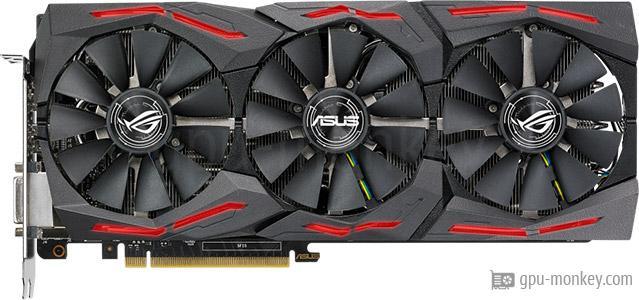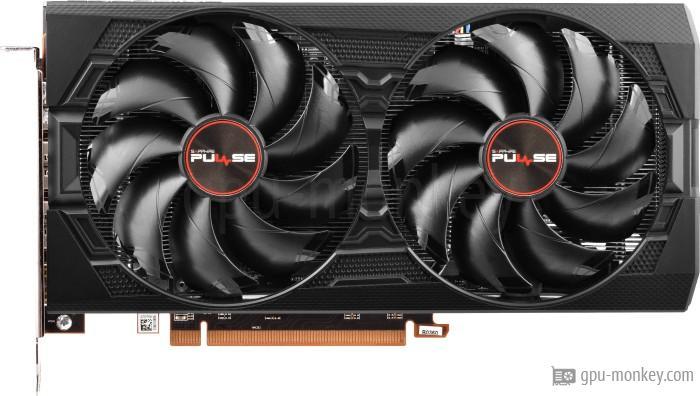
ASUS ROG Strix GeForce GTX 1080 Ti
vs
Sapphire Pulse Radeon RX 5500 XT 4G
GPU comparison with benchmarksIn the gpu comparison between the ASUS ROG Strix GeForce GTX 1080 Ti and the Sapphire Pulse Radeon RX 5500 XT 4G, we compare both the technical data and the benchmark results of the two graphics cards.
|
||
GPUThe ASUS ROG Strix GeForce GTX 1080 Ti is based on the NVIDIA GeForce GTX 1080 Ti and has 3584 texture shaders and 28 execution units. Sapphire Pulse Radeon RX 5500 XT 4G is based on AMD Radeon RX 5500 XT, which has 1408 shaders and 22 execution units. |
||
| ASUS ROG Strix GeForce GTX 1080 Ti | GPU | Sapphire Pulse Radeon RX 5500 XT 4G |
| NVIDIA GeForce GTX 1080 Ti | Based on | AMD Radeon RX 5500 XT |
| GP102-350-K1-A1 | GPU Chip | Navi 14 XTX |
| Pascal | Architecture | RDNA 1 |
| 28 | Streaming Multiprocessors | 22 |
| 3584 | Shader | 1408 |
| 88 | Render Output Units | 32 |
| 224 | Texture Units | 88 |
| 0 | Raytracing Cores | 0 |
MemoryThe ASUS ROG Strix GeForce GTX 1080 Ti has 11 GB of graphics memory of the type GDDR5X and achieves a memory bandwidth of 484 GB/s. The Sapphire Pulse Radeon RX 5500 XT 4G can access 4 GB GDDR6 graphics memory and thus achieves a memory bandwidth of 224 GB/s. |
||
| 11 GB | Memory Size | 4 GB |
| GDDR5X | Memory Type | GDDR6 |
| 1.388 GHz | Memory Clock | 1.750 GHz |
| 11.1 Gbps | Memory Speed | 14.0 Gbps |
| 484 GB/s | Memory bandwidth | 224 GB/s |
| 352 bit | Memory Interface | 128 bit |
Clock SpeedsThe ASUS ROG Strix GeForce GTX 1080 Ti clocks in the base with up to 1.493 GHz. The base frequency of the Sapphire Pulse Radeon RX 5500 XT 4G is 1.607 GHz. |
||
| 1.493 GHz | Base Clock | 1.607 GHz |
| 1.632 GHz | Boost Clock | 1.845 GHz |
| 1.61 GHz | Avg (Game) Clock | 1.74 GHz |
| Yes | Overclocking | Yes |
Thermal DesignThe TDP (Thermal Design Power) of the ASUS ROG Strix GeForce GTX 1080 Ti is 250 W. The graphics card is supplied with energy via the 2 x 8-Pin connector. The Sapphire Pulse Radeon RX 5500 XT 4G has a TDP of 135 W and is supplied with the required energy via 1 x 8-Pin PCIe power connectors. |
||
| 250 W | TDP | 135 W |
| -- | TDP (up) | -- |
| 91 °C | Tjunction max | 95 °C |
| 2 x 8-Pin | PCIe-Power | 1 x 8-Pin |
Cooler & FansThe ASUS ROG Strix GeForce GTX 1080 Ti has a total of 3 Axial fans. The Sapphire Pulse Radeon RX 5500 XT 4G has 2 Axial fans to cool the GPU and memory. |
||
| Axial | Fan-Type | Axial |
| 3 x 90 mm | Fan 1 | 2 x 95 mm |
| -- | Fan 2 | -- |
| Air cooling | Cooler-Type | Air cooling |
| 0 dB | Noise (Idle) | 0 dB |
| -- | Noise (Load) | 41 dB |
ConnectivityIn the connectivity category, we recorded the number of ports on a graphics card. A total of 4 screens can be connected to the ASUS ROG Strix GeForce GTX 1080 Ti. The Sapphire Pulse Radeon RX 5500 XT 4G supports a maximum of 4 screens. |
||
| 4 | Max. Displays | 4 |
| 2.2 | HDCP-Version | 2.3 |
| 2x HDMI v2.0b | HDMI Ports | 1x HDMI v2.0b |
| 2x DP v1.4 | DP Ports | 3x DP v1.4 |
| 1 | DVI Ports | -- |
| -- | VGA Ports | -- |
| -- | USB-C Ports | -- |
FeaturesetThe ASUS ROG Strix GeForce GTX 1080 Ti supports a maximum resolution of 7680x4320 pixels. The maximum resolution of the Sapphire Pulse Radeon RX 5500 XT 4G is 7680x4320 pixels. |
||
| 7680x4320 | Max. resolution | 7680x4320 |
| 12_1 | DirectX | 12_1 |
| No | Raytracing | No |
| Yes | DLSS / FSR | Yes |
| ASUS Aura Sync | LED | No LED lighting |
Supported Video CodecsThe support and acceleration of certain video codecs directly in the graphics card reduces the load when playing or creating videos. |
||
| Decode / Encode | h264 | Decode / Encode |
| Decode / Encode | h265 / HEVC | Decode / Encode |
| No | AV1 | No |
| Decode | VP8 | Decode |
| Decode | VP9 | Decode / Encode |
DimensionsThe ASUS ROG Strix GeForce GTX 1080 Ti is 298 mm long, 134 mm high and 53 mm wide. The Sapphire Pulse Radeon RX 5500 XT 4G is 233 mm long, 122 mm high and 40 mm wide. |
||
| 298 mm | Length | 233 mm |
| 134 mm | Height | 122 mm |
| 53 mm | Width | 40 mm |
| 3 PCIe-Slots | Width (Slots) | 2 PCIe-Slots |
| -- | Weight | -- |
| PCIe 3.0 x 16 | GPU Interface | PCIe 4.0 x 8 |
Additional dataThe ASUS ROG Strix GeForce GTX 1080 Ti was released in Q1/2017 at a price of 699 $ (Reference). The Sapphire Pulse Radeon RX 5500 XT 4G was introduced in Q3/2019 at a price of 169 $ (Reference). |
||
| ROG-STRIX-GTX1080TI-11G-GAMING | Part-no | 11295-03-20G |
| Q1/2017 | Release date | Q3/2019 |
| 699 $ (Reference) | Launch Price | 169 $ (Reference) |
| 16 nm | Structure size | 7 nm |
| data sheet | Documents | data sheet |
Rate these graphics cards now
Benchmark results
3DMark Benchmark (DirectX, Raytracing)
3DMark is a benchmark program that determines the performance of certain components of a computer and then reports the performance as a numerical value.
Time Spy Extreme Graphics score

|
ASUS ROG Strix GeForce GTX 1080 Ti
11 GB GDDR5X |
||

|
Sapphire Pulse Radeon RX 5500 XT 4G
4 GB GDDR6 |
||
The Last of Us Part 1
The Last of Us Part One is a game released by Sony in June 2013 exclusively for the Playstation and released for the PC in early 2023. The benchmark values here were determined at high details.
2560x1440 (1440p)

|
Sapphire Pulse Radeon RX 5500 XT 4G
4 GB GDDR6 |
||
1920x1080 (1080p)

|
Sapphire Pulse Radeon RX 5500 XT 4G
4 GB GDDR6 |
||
Battlefield 5
Battlefield 5 is a visually stunning game that is ideal as a graphics card benchmark. We test the game with maximum details on Windows 10.
3840x2160 (2160p)

|
ASUS ROG Strix GeForce GTX 1080 Ti
11 GB GDDR5X |
||

|
Sapphire Pulse Radeon RX 5500 XT 4G
4 GB GDDR6 |
||
2560x1440 (1440p)

|
ASUS ROG Strix GeForce GTX 1080 Ti
11 GB GDDR5X |
||

|
Sapphire Pulse Radeon RX 5500 XT 4G
4 GB GDDR6 |
||
1920x1080 (1080p)

|
ASUS ROG Strix GeForce GTX 1080 Ti
11 GB GDDR5X |
||

|
Sapphire Pulse Radeon RX 5500 XT 4G
4 GB GDDR6 |
||
Geekbench 6 (OpenCL, Vulkan, Metal)
Geekbench 6 is a cross-platform benchmark for main processors, which also carries out 3 different graphics benchmarks and outputs them in the form of a numerical value.
Geekbench 6 - OpenCL

|
ASUS ROG Strix GeForce GTX 1080 Ti
11 GB GDDR5X |
||

|
Sapphire Pulse Radeon RX 5500 XT 4G
4 GB GDDR6 |
||
Geekbench 6 - Vulkan

|
ASUS ROG Strix GeForce GTX 1080 Ti
11 GB GDDR5X |
||

|
Sapphire Pulse Radeon RX 5500 XT 4G
4 GB GDDR6 |
||
Geekbench 6 - Metal

|
Sapphire Pulse Radeon RX 5500 XT 4G
4 GB GDDR6 |
||
FP32 Performance (Single-precision TFLOPS)
The theoretical computing power of the graphics card with single precision (32 bit) in TFLOPS indicates how many trillion FP32 floating point operations the graphics card (GPU) can perform per second.
FP32 (TFLOPS)

|
ASUS ROG Strix GeForce GTX 1080 Ti
11 GB GDDR5X |
||

|
Sapphire Pulse Radeon RX 5500 XT 4G
4 GB GDDR6 |
||
Popular comparisons










